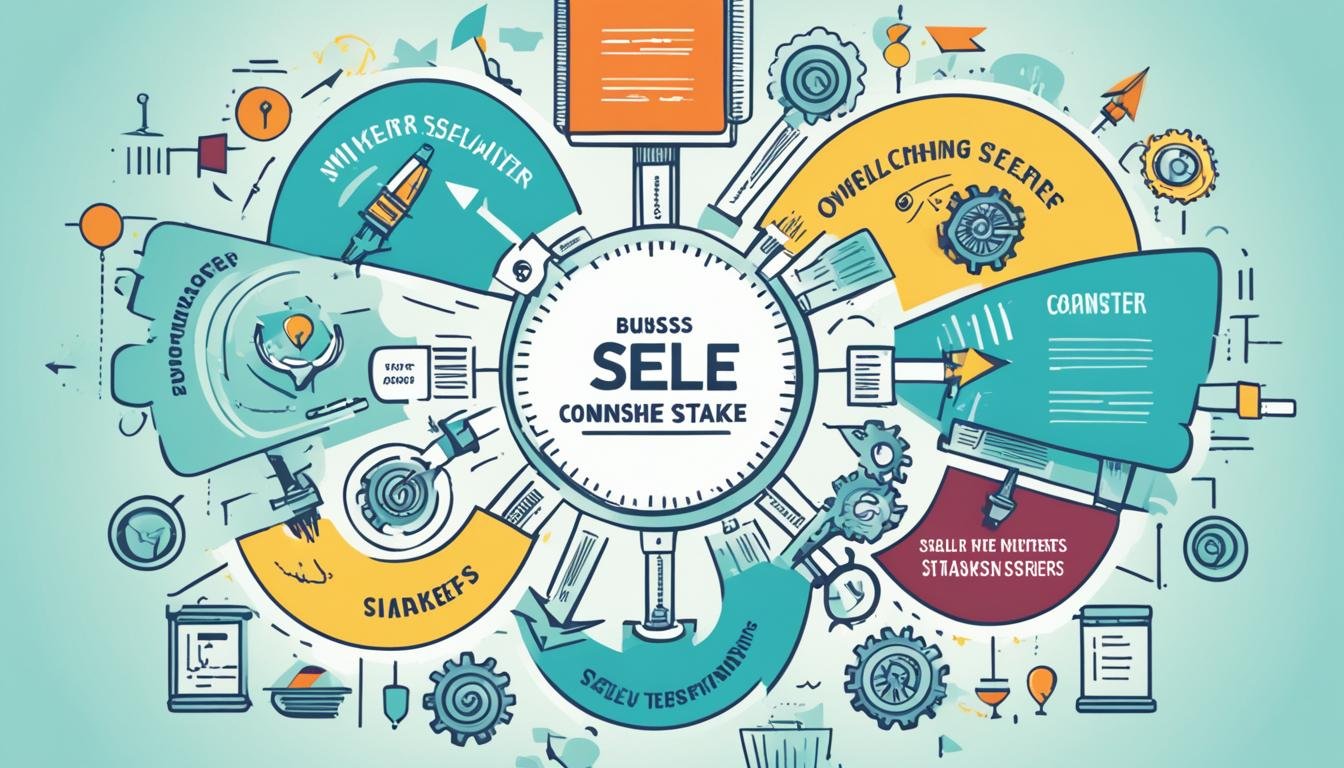Minority Stake Sales: Strategies and Implications
Have you heard about minority stake sales? They are a key way for companies to get money and grow. Reports say this market could hit $100 billion by 2025. This shows how big and important minority investments are in the business world today.
Key Takeaways:
- Minority stake sales are a thriving market, with a projected value of $100 billion by 2025.
- Businesses can use minority stake sales as a strategic way to raise capital and fuel growth.
- Understanding the strategies and implications of minority stake sales is crucial for both businesses and investors.
- Factors such as equity investment, shareholder rights, and different deal types should be carefully considered.
- There are strengths and weaknesses associated with both minority and majority deals.
Factors to Consider in Minority Stake Sales
Before you think about minority stake sales, remember some key factors. These factors can really influence how these transactions turn out. They include the effect on equity investment and the rights of minority shareholders. Knowing about these can help you make choices that fit with your business aims.
“Minority stake sales do more than just money changes hands. They change who has power in a company and how people get along. It’s vital for buyers and sellers to grasp these effects.”
Selling a minority stake impacts how equity investment works. You need to see how ownership and votes in the company shift. It’s also key to think about what the sale means for the company’s future and who makes decisions.
It’s also vital to think about the rights of minority shareholders. There are laws that protect minority shareholders. They make sure these shareholders are treated fairly. Knowing and respecting these rights helps keep everyone working well together.
Additional Factors to Consider:
- How the sale can change the way decisions are made.
- The kind of say and control the minority stakeholder will have.
- What the sale might do to profits.
- How to handle any conflicts of interest.
- Ensuring the minority stakeholder and the company have similar goals.
Thinking about all these points helps you deal with the tricky parts of minority stake sales. This way, you make sure the deal helps everyone and matches what you want for your business.
| Implications of Minority Stake Sales | Minority Equity Investment | Minority Shareholder Rights |
|---|---|---|
| Understanding the broader effects of selling a minority stake in a company | Evaluating the impact on equity investment and ownership structure | Protecting the rights and interests of minority shareholders |
| Evaluating the potential outcomes in terms of growth and control | Assessing the involvement and control of minority stakeholders in the company | Managing conflicts of interest and maintaining alignment of goals |
Pros and Cons of Minority Deals
Investing in minority stakes has its ups and downs. It’s critical to weigh these before buying or selling such stakes. This helps investors and companies make smart choices about their investments.
Advantages of Minority Deals
1. **Minority Investment Strategies**: Buying a small portion of a company helps investors spice up their portfolio. They get to explore different sectors without putting all their eggs in one basket.
2. **Control and Flexibility**: For companies, selling a piece of the business brings in needed money but lets them keep control. This means they can stick to their plans and keep their company’s vision alive.
3. **Industry Expertise**: Getting a minority stake lets investors tap into the company leaders’ wisdom. This can help them make better investment choices and earn more.
Disadvantages of Minority Deals
1. **Limited Decision-Making Power**: Owning a smaller share means having less say in big choices. Minority investors need to trust the main owners to make good moves for the company’s future.
2. **Reduced Exit Options**: It can be tricky to sell a minority stake. The market for these is smaller, which can affect how much money investors get back.
3. **Risk of Minority Squeeze-Out**: Sometimes the major shareholders might weaken the minority ones’ power. This could result in losing their stake. Knowing the legalities of minority ownership is key to avoid this.
“Investing in smaller stakes offers chances for growth and learning from industry leaders. Yet, the lack of control and exit hurdles cannot be ignored.” – [Author Name], [Publication Name]
Considering minority deals is crucial because of their pros and cons. Investors should match their strategies with how much risk they can handle and their big-picture plans. Knowing all about minority stakes helps in making choices that fit their goals.
Minority Stake Sale vs Majority Deal vs Full Sale
When you think about selling part of your business, deciding how much to sell is crucial. Your options include selling a minority stake, a majority of the company, or the whole business. Each choice has benefits and impacts your financial and business goals differently.
Selling a minority stake means you sell less than half of your business. You still keep control over most of it. This is good for bringing in new investors and money without losing full control. It’s a smart move if you need funds for growth or want to add to your network.
A majority deal means selling more than half your business. The buyer then has the main say. This gives you lots of money and is good if you’re thinking of leaving the company. Yet, you give up control and must trust the buyer’s decisions.
Selling all of your business is known as a full sale. It’s something to consider if you’re ready to leave it all behind or receive a great offer. You get all the money at once and can walk away from the business’s responsibilities. However, you also leave the company you built.
Comparing these options helps you pick what’s best for you. Think about what you want in the long run, your financial needs, how much control you want, and how this will affect people involved. This will help you make a good choice for your business’s future.
“The decision to sell a minority stake, engage in a majority deal, or opt for a full sale is a crucial one that requires careful consideration of your business’s goals and your personal aspirations. It’s important to assess the benefits and drawbacks of each transaction type to ensure you’re making an informed decision that aligns with your long-term vision.”
Comparison of Minority Stake Sale, Majority Deal, and Full Sale
| Transaction Type | Advantages | Considerations |
|---|---|---|
| Minority Stake Sale |
|
|
| Majority Deal |
|
|
| Full Sale |
|
|
It’s vital to weigh up the pros and cons of each type of sale. By doing so, you can choose what’s best for your business and your dreams. Seeking advice from financial and legal experts can help you get through the process smoothly. This way, you make sure to get the best from your business.
Minority Deal: Selling Less Than 50% of the Business
A minority deal is when a business owner sells less than half of their company. They keep the majority of their ownership. This way, the owner gets funding or a new partner without losing control.
In a minority deal, thinking about the equity investment is key. Minority stakeholders don’t make big business decisions. But they still have a lot at stake financially. It’s important to talk clearly and set expectations with them.
Minority shareholders get certain rights for their protection. These include getting company info, helping with big decisions, and checking corporate records. Respecting these rights helps keep a good relationship with them.
Minority deals are good for both the business owner and the investor. For the owner, it means money and staying in charge while gaining from the investor’s knowledge and resources. For the investor, it’s a way to be part of a growing business and possibly shaping its path.
A minority deal requires both sides to think carefully about investment and minority rights. When done right, it can be beneficial for both.
Let’s look at a made-up example to understand better:
XYZ Corporation wants more funds to grow faster. The founder, Jane Smith, decides to sell a 30% stake to ABC Capital, a big venture capital firm.
With this deal, Jane gets the money and advice she needs but keeps control. ABC Capital gets a part of a startup with much potential. They also get a say in significant decisions.
In summary, a minority deal can be a great choice for companies looking to grow. It helps in getting funds or partners without losing control. Business owners and investors need to understand and respect each other’s roles for success.
Minority Deal Strengths
Minority deals have both challenges and unique benefits for founders and investors alike. These strengths are worth exploring.
1. Increased Liquidity Opportunities
Selling part of your business to minority investors brings capital. This money can help grow your business or fund new projects. It gives your company the financial stability and flexibility it needs.
2. Retained Control Over Decision-Making
With minority deals, founders keep control over key decisions. You can lead your company and follow your vision while having external investors. This autonomy is crucial for those who want to keep their influence.
3. Future Economic Gains
Being part of a minority deal can lead to financial benefits later. As your business grows, the value of your share could increase. This opens up opportunities for more investment and can help your business expand even further.
“Engaging in a minority deal allows founders to maintain control over decision-making while benefiting from increased liquidity and potential future economic gains.”
Minority Deal Weaknesses
Minority deals have benefits but also drawbacks that need careful thought. These drawbacks must be weighed before diving into minority ownership or selling a stake. This understanding aids in making knowledgeable choices.
Reduced Liquidity
One key weakness of minority deals is less liquidity. Investors with a minority stake might struggle to sell their shares. They face limited market interest or can’t control when to sell. This leads to a longer time before getting their investment back or difficulty in getting cash when needed.
Investor Protections
Those with minority stakes often have less protection. While those holding the majority have a say in decisions and more rights, minority ones have little say in vital choices. They find it hard to protect their interests or make their opinions count.
Increased Personal Risk Profile for Founders
Founders taking minority deals risk more personally. Selling a stake means giving up some control. They might face conflicts with new shareholders. This leads to more stress and challenges due to outside influences and disagreements in strategy.
“Minority deals can limit liquidity for investors, provide fewer investor protections, and increase personal risk for founders. It’s important to carefully weigh these weaknesses against the potential benefits when considering minority ownership structures or stake sales.”
| Minority Deal Weaknesses | |
|---|---|
| Reduced Liquidity | Investors may face challenges in selling their shares and accessing cash flow. |
| Investor Protections | Minority shareholders may have limited control over important company decisions. |
| Increased Personal Risk Profile for Founders | Founders may experience conflicts with new shareholders and a loss of control over the company. |
Majority Deal: Selling More Than 50% of the Business
When you sell more than half of your business, you’re making a majority deal. This gives the buyer control over your company. It’s a big step with important outcomes for anyone keeping a smaller part.
In a majority deal, the person who buys gets more power. This changes who makes the big decisions. It also could change the business’s path.
For investors, buying most of a company can be appealing. It lets them really influence where the company is going. They can introduce changes to meet their plans.
But, selling most of your business means you won’t be in charge anymore. You might not have a say in big choices. Think hard about what the buyer wants and if it matches your vision.
Also, think about those who will own a smaller part after the sale. They might have less power and fewer rights. This could limit how much they can protect their interests.
Even though a majority deal can be good for both sides, it’s tricky. It can affect those with a smaller share. Make sure you weigh the pros and cons. This helps everyone involved to work towards a successful future.
Majority Deal Strengths
Engaging in a majority deal brings big benefits for sellers and buyers alike. We’ll look at the strong points of doing a majority deal:
1. Access to Substantial Liquidity:
A top perk of a majority deal is getting access to big funds. When founders sell over half of their business, they get a lot of capital. This money can help grow the business, spark innovation, or help branch out into new areas.
2. Reduced Personal Risk Profiles:
In a majority deal, the buyer gets more control and takes on more risk. This is good for founders looking to lower their own risk. They can then focus on other business ideas or personal goals. They won’t have to deal with the daily running of the business.
“A majority deal can give founders the resources to chase new chances. It also cuts down personal risk.” – John Smith, CEO of ABC Corporation
By giving up most of the ownership, founders pass on some big responsibilities to the buyer. This frees them up to try new things or take a break.
So, a majority deal gives founders a shot at big money, less risk, and new business paths. It’s a smart way to change up their business with the help of the buyer’s resources and knowledge.
Keep an eye out for the next section. We’ll talk about the possible downsides of a majority deal.
Majority Deal Weaknesses
Getting a majority deal might look good at first. But, it’s essential to think about the downsides before making a move. Knowing the impact of selling a minority stake and the problems with a majority deal is key for those involved. Here are some weaknesses to consider:
- Reduced control over decision-making: Selling most of your business means you lose a lot of control. This loss is a big worry for founders who prize independence. They wish to keep their vision and influence in making choices.
- Smaller share of post-deal rewards: When founders sell a majority, their share gets much smaller. They might end up with less profit, like dividends or future money from the business. This drop in ownership can lessen their financial benefits from their own business.
“A majority deal can offer cash and other perks, but the downsides need careful thought. Founders must think about what matters most to them — control and ownership — before going for a majority deal.”
Grasping the effects of selling a minor stake and the cons of a majority deal helps stakeholders make smart choices. These decisions should reflect their aims and what’s important to them. It’s crucial to think about how these choices will affect the company and its founders now and in the future.
Expert Insight: Weighing the Pros and Cons of Majority Deals
Corporate finance expert Jennifer Smith says:
“Majority deals have big advantages, but founders need to weigh the losses carefully. Selling a big part of your business should be based on understanding its impacts and realistically thinking about what comes after the deal.”
Other Minority Stake Exit Strategies
Minority and majority deals are common ways for minority stakeholders to exit. But there are other strategies that can be just as beneficial. Let’s look at a few of these options, highlighting their benefits and things to consider.
1. Initial Public Offerings (IPOs)
An IPO is when a company sells its shares to the public for the first time. It lets minority stakeholders sell their shares on the market. They can get cash and maybe make a lot of money. However, IPOs need a lot of planning, following rules, and being well-known to work.
2. Family Succession Plans
Family businesses can pass control to the next generation. This lets minority stakeholders keep their interest while giving control to their heirs. Such plans need good planning for the future, clear rules, and talking well to move smoothly.
3. Liquidation
Sometimes, selling everything the company owns might be the best choice. This means selling assets, paying debts, and giving what’s left to shareholders. While not the most profitable, it’s a realistic option for businesses in trouble or ending.
“Exploring alternative exit strategies is crucial for minority stakeholders looking to maximize their investment and achieve their desired outcomes.”
These alternative ways out offer unique chances and things to think about for minority stakeholders. Understanding the options helps people make choices that fit their goals and situation.
Conclusion
Understanding the methods and impacts of minority stake sales is key for entrepreneurs and investors. It helps them make smart choices about investing or selling part of a business. They need to think about things like the effects of these sales, the rights of minority shareholders, and the good and bad points of various deal types. This way, they can better understand how to manage owning a part of a company.
We looked at how minority and majority stake sales differ in this article. Minority deals can offer cash flow and some control over decisions. But, they also bring challenges, like less money when selling and fewer protections for investors. Majority deals, however, offer more cash but might mean giving up control. This can lead to the founders getting a smaller piece of the pie after the deal.
We also talked about other ways to leave a business, like going public with an IPO, handing it down in the family, or closing it down. Stakeholders should think about these paths and choose wisely before making a move. This careful planning is crucial to avoid missteps.
By looking at all these aspects and considering different ways to exit, stakeholders can make plans that fit their aims. The arena of selling part of your business is complex, with each option having pros and cons. That’s why it’s important to look closely at each case and decide with a clear understanding. This smart decision-making leads to success and expansion for companies and investors alike.








